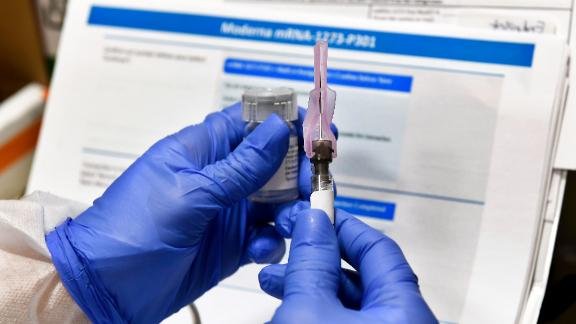FDA says Moderna’s vaccine is effective, safe; 2nd virus shot may be authorized this week

WASHINGTON, DC — Hundreds more U.S. hospitals are set to begin vaccinating their workers Tuesday as federal regulators issued a positive review of a second Covid-19 vaccine shot needed to boost the nation’s largest vaccination campaign.
The Food and Drug Administration said in documents posted online that its initial review confirmed the effectiveness and safety of the vaccine developed by Moderna and the National Institutes of Health, bringing the shot to the cusp of U.S. authorization.
A panel of outside experts will offer their recommendation Thursday, with a final FDA decision expected soon thereafter.
The positive news comes as hospitals across the U.S. begin ramping up vaccinations with the shot developed by Pfizer and BioNTech’s, which the FDA cleared last week.
Packed in dry ice to stay at ultra-frozen temperatures, shipments of Pfizer’s Covid-19 vaccine are set to arrive at 400 additional hospitals and other distribution sites, one day after the nation’s death toll surpassed a staggering 300,000. The first 3 million shots are being strictly rationed to front-line health workers and elder-care patients, with hundreds of millions more shots needed over the coming months to protect most Americans.
A second vaccine can’t come soon enough as the country’s daily death count continues to top 2,400 amid over 210,000 new daily cases, based on weekly averages of data compiled by Johns Hopkins University. The devastating toll is only expected to grow in coming weeks, fueled by holiday travel, family gatherings and lax adherence to basic public health measures.
The first vaccine deliveries have provided a measure of encouragement to exhausted doctors, nurses and hospital staffers around the country.
Because the vaccine requires two rounds, the people getting injections now will need a second shot in about three weeks.
Shots for nursing home residents won’t begin in most states until next Monday, when some 1,100 facilities are set to begin vaccinations.
U.S. officials have reiterated their projection that 20 million Americans will be able to get their first shots by the end of December, and 30 million more in January.
That projection assumes swift authorization of the Moderna vaccine up for review this week. Like the Pfizer-BioNTech vaccine, Moderna’s requires two shots for full protection.
Last month, Moderna and NIH reported that their shot appeared to be nearly 95% effective across various ages and racial groups, according to results from an ongoing 30,000-person study. The main side effects were fatigue, muscle aches and injection-site pain after the second dose. Those flu-like reactions are common to many vaccines and are a sign the vaccine is revving up the immune system to help fight off the virus.
Moderna reported no major safety problems from its study. But FDA’s panel is certain to scrutinize the data for any indications of possible severe allergic reactions or other rare side effects. Officials in the U.K. are investigating several adverse reactions there with Pfizer’s vaccine and FDA is closely monitoring the rollout here for similar reports.
Both Moderna’s and Pfizer-BioNTech’s shots are so-called mRNA vaccines, a brand-new technology. They aren’t made with the coronavirus itself, meaning there’s no chance anyone could catch it from the shots. Instead, the vaccine contains a piece of genetic code that trains the immune system to recognize the spiked protein on the surface of the virus.
